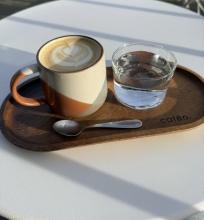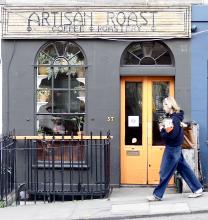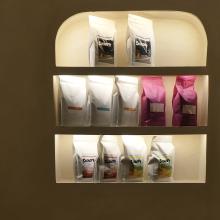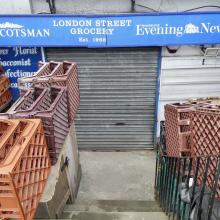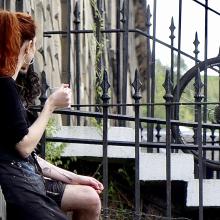
There is undoubtedly a cultish aspect to specialty, third wave or ‘artisan’ coffee, writes Charlie Ellis.
Certain cafes are revered; the best baristas venerated; the leading roasters worshipped. Cult Espresso (104 Buccleuch Street) is a playful nod to this. Spurtleshire has been deeply infiltrated by the specialty sect.
As a movement, specialty coffee has grown inexorably in the UK since around 2007 (previously, Italian-style espresso was the choice of the coffee snob). The number of devotees and places of worship grows every month. Typically, such establishments take their coffee seriously, focusing on sourcing high-quality coffee beans and employing precise processing and brewing methods.
In northeast-central Edinburgh, pioneers such as Artisan Roast have been joined, in recent years by representatives of Edinburgh’s Espresso elite, such as Cafen, Ante and Kul. There is scope for a good coffee crawl in the area, though you might need to switch to decaf in order to prevent yourself from drifting from nicely caffeinated to ‘wired’. Luckily, all these places serve top-class decaf, far beyond the pale imitations of the past.
A new coffee bar has recently joined the list.
Espirito Santu
Spurtleshire now has its own shrine, its cathedral to specialty coffee: Santu’s roastery at 23 Union Street. They have been roasting coffee here for some time but have recently set up a coffee bar within the building, open to the public. It offers an absolutely glorious place within which to enjoy high-quality coffee.
As a venue it offers a peaceful retreat, distinct from some of the very busy cafes you will find across the city. Santu has its own established little coffee bar on the Canongate. Small and snug, it’s primarily for takeaway. A place to grab a quick coffee. A place to caffeinate tourists as they explore the Old Town.
The place on Union Street is very different in scale and in the general vibe, existing in a parallel world sans bustle and urgency.
An ethereal air
As you walk in you’re immediately aware of the size and scale of the place, a place of light and minimalism, with light streaming in through the roof. Music, minimalist ambient lilting gently through the space. (Shinsen by Susoro Yokota was one track I heard.)
The cathedral or church comparison is not ridiculous. The high ceiling gives it an ethereal air, while the centrepiece, the altar, if you wish, is the vast, industrial-scale roaster. From this huge machine emanates all the goodness which Santu produces.
Here they roast beans from farmers they have a direct relationship with in the Espirito Santo region of southeastern Brazil. The main focus remains the roasting and packing-up of beans (Santu supplies a number of cafes, hotels and eateries across the city). According to the labels on the boxes, Urban Angel, Voco Hotel, the Double Tree Hilton were among those about to receive a fresh batch.
The new coffee bar seems to be a case of testing the water. A large number of their present customers come from nearby offices (who get a 20 percent discount), but word will surely spread. One of these customers talked of the ‘lovely fruity smell’ that often seeps into his workplace. Coffee can change the atmosphere. Santu has started out on a small scale, with seats for about a dozen. They could, if they wished, expand this greatly, but, if the place were filled with chatter, it might change the character out of all recognition.
A steady drip
At present, it’s possible to sit in and absorb the gentle pulsing tunes, with the reverberating coffee sounds adding a background rhythm: beans being bagged, milk being frothed, and milk jugs being tapped down (to remove bubbles and create smoothly textured milk).
It feels like a spot with a different pace, shorn of the urgency of the world outside. Yet, as you sit you are only a short distance from busy streets and indeed the city centre (St James Quarter). Even writing about a ‘hidden gem’ such as this feels risky – helping to encourage many others to visit, to breach the peace. At present, the place is only attracting a steady drip of customers, not (in coffee terms), a V60 pour-over, not a rapid stream of espresso.
The place also has the character of an art space or gallery. Those first-comers arriving through the door move around at the pace you would in a gallery, looking about with some reverence at their surroundings, taking it all in. Indeed, the place was previously the home of Edinburgh Printmakers, which has now moved on to Fountainbridge. They recently celebrated their evolution with excerpts from their archive, including some material from the Union Street days. The main ‘installation’ at Santu is undoubtedly the massive Probat roaster. The scale of it is impressive, almost Paolozzi-like in its size and dominance over the hall.
Culturally expropriating?
Prior to Edinburgh Print Works, the building was a washhouse, the ghost signs of which run down the side of the hall (trying to decipher what they say is a good little game). More broadly, Santu is an illustration of the way that specialty coffee has played a leading role in finding creative new uses for old structures. In particular, specialty coffee is closely associated with an industrial aesthetic. For some, this is mere affectation, ‘culturally expropriating’ an industrial aspect, while actually manifesting part of its erasure.
This is surely too harsh. Specialty coffee, though closely identified with gentrification, in some ways is an example of a new mode of local industry, not its negation. Coffee roasteries have been springing up across the city in recent years, including in areas traditionally associated with industry (Granton, Peffermill, Leith), as well as within central parts of the city – such as Santu in Spurtleshire.
I didn’t realise the time
During my visit to Union Street, the service was gentle, with the barista letting customers know that he would deal with them in due course (‘I won’t be too long’). On ordering a batch brew, I was told this would take a while, ‘about 5 minutes’. I was only too happy to wait, especially in such an atmosphere.
Nothing was rushed, which is key to maintaining quality with specialty coffee. This expensive product requires precise brewing methods to extract the best. Good things come to those who wait. Indeed, the barista himself got lost in his work. When his colleague suggested that it was break time, the barista admitted, ‘I didn’t realise the time.’ I daresay that we’d all be living better lives if we could get truly lost in what we do, without the need to be constantly conscious of the time sidelined.
However, be warned: when beans are being roasted, the still calm is broken by the rumbling and roaring of the roaster. This tends to drown out the music and may overwhelm casual chatter. Outwith these times, Santu’s Roastery and coffee bar offer an answer to the prayers of many.
---------------
